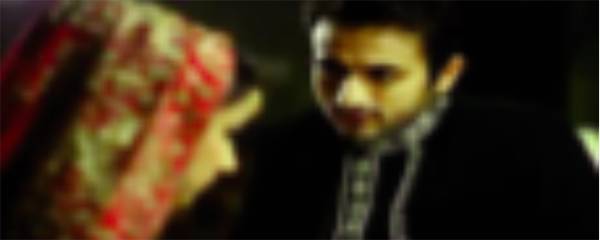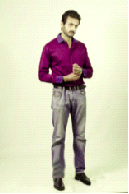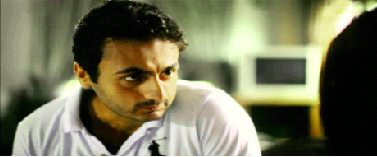
Finally! A Hum TV drama, that too as the lead. Not the brother, villain or son, but the lead! Finally no more of random A-Plus dramas and Express tele-films. I was over the moon. I didn’t really care so much for the money, or whether I was paid on my first day or my last (in many cases meaning your last day on earth). My kharcha paani (expenses) had previously been provided by my parents, and in any case, I could always survive on daal chawal. What was more important for me was that I had reached this place solely on my own. No help from my parents, no sifarish from random quarters, not even any bribery. I had reached this stage with no help from anyone, apart from themoral support, which was valuable enough.
 I was acting as the lead in the Hum TV drama Main Dewani, starring the charismatic Sanya Samshad and formerly charismatic Jamal Shah. I came from a known family, which obviously meant I must be, you know, well off. Imagine their surprise when I arrived on set the first day on a rickshaw. Hey, I wasn’t trying to make a rebellious point. Well that too, but primarily because I didn’t have the money to pay for a cab. There were no Careems or Ubers in those days, and I could not afford a 500-600 cab one way. Not having the money for accommodation, I was staying at an old NCA friend’s house in Gulshan-e-Iqbal, where niswar was in abundance (the house happened to be next to Shahid Afridi’s house). Apparently people used to be very scared there. Maybe it was the humid sea air making the people paranoid. But I had been in Karachi enough times to take care. But of course that didn’t mean that I curtailed my freedom. Before going out at night, I would put my cheaper phone – a Nokia something something – in my pocket and 200-300 rupees of hard cash in my socks, and I was ready to go! Thus started my Karachi adventures. From roaming the Gulshan-e-Iqbal streets at 3 in the morning to striking up conversations with random strangers, some running away with the fear of me being a mobile snatcher, it was all an experience to remember.
I was acting as the lead in the Hum TV drama Main Dewani, starring the charismatic Sanya Samshad and formerly charismatic Jamal Shah. I came from a known family, which obviously meant I must be, you know, well off. Imagine their surprise when I arrived on set the first day on a rickshaw. Hey, I wasn’t trying to make a rebellious point. Well that too, but primarily because I didn’t have the money to pay for a cab. There were no Careems or Ubers in those days, and I could not afford a 500-600 cab one way. Not having the money for accommodation, I was staying at an old NCA friend’s house in Gulshan-e-Iqbal, where niswar was in abundance (the house happened to be next to Shahid Afridi’s house). Apparently people used to be very scared there. Maybe it was the humid sea air making the people paranoid. But I had been in Karachi enough times to take care. But of course that didn’t mean that I curtailed my freedom. Before going out at night, I would put my cheaper phone – a Nokia something something – in my pocket and 200-300 rupees of hard cash in my socks, and I was ready to go! Thus started my Karachi adventures. From roaming the Gulshan-e-Iqbal streets at 3 in the morning to striking up conversations with random strangers, some running away with the fear of me being a mobile snatcher, it was all an experience to remember.
Not having money for food, however, was irritating. I would survive on two packets of Maggi noodles a day, and when I did not even have enough for that, my friend, who was a great cook, would graciously cook me some Gobi masala. I then had to move, since his family was coming over from Dubai or somewhere, so I shifted to the next best option; a five star 1 bedroom ‘apartment’ in the middle of North Nazimabad, with three of us in a single room and a mysterious doped up ‘saeen’ on the roof.
I loved all that. What I hated was having to interact with the actors, directors and producers. Arrogant celebrity actors, ever-so-busy directors manufacturing plays and powerful producers would make you listen to their meaningless mundane gossip. For hours, I had to smile and listen to who had how much money in their bank account, who was having an affair with whom, or just how great each and every one of them was. And the lackeys around appreciated the inane talk as though it consisted of pearls of wisdom. During the shooting, I got an offer for a lead in another serial, and I happily – and greedily – took it. What resulted was the most hectic schedule I could imagine. I would go to the Main Dewani set at 8 in the morning, shoot for 12 hours straight, then take a break at 8pm and go to the other shoot, for which I would be already late. After getting free at around 12 am I would then rush back to the first set. There would be times when I would do an entire scene, and on my way home realise I had spoken as the wrong character!

Initially both the directors thought I was putting on a show, since actors start most of their sentences with, “Hello how are you, I just came from a big shoot...” and end with, “Anyway, I’m off to my big shoot”. In fact most of the time they were just going to shower before the water ran out again.
Of course, I had no cause to complain. Most fresh graduates have to wind and grind for years before they get a half decent job. And here was I, still a student, being served Subways and coffees on demand, paid good money, not to mention the adoration of fans.
The drama was one of the better received ones. Revolving around a girl who has “erotomania”, most probably a made up mental condition in which you cannot stick with one partner. Yes, now you know why it was so well received. My character ends up being her final choice, and the one she marries. Unfortunately she then falls for my character’s uncle! The other drama I was shooting for involved my character’s wife becoming a witch. So I guess pretty similar story lines there.
I loved all the attention I started getting after the drama aired. People started recognising me on the streets, paying for me at the barber shop, my friends pointing out to their parents on the TV, “That’s my friend!” After a while however, I started missing the good old times. I could not be myself in public places. I could not do stupid stuff with my friends. Not to mention the eerie feeling of always ‘being watched’. I also realised fame and money were not the answer. I would rather spend my time doing something worthwhile. Not spending hours shooting meaningless dramas, and then gazing at yourself on the screen. I realised that the work being done by Ajoka Theatre, where I grew up as a child, was much more worthwhile. Of course it was not highly paid and did not offer instant stardom, but it was more satisfying and meaningful. Theatre actors rehearse for months, memorise pages and pages of dialogue and have no option for a “retake”. The distant “stars” glow at night (and sleep during the day) but the “tarey zameen par” (stars on the ground) light up the path for the travellers. I realised if you can change even one person’s perspective, touch even one person’s heart, then you have done your job.
Then, for a split second, you feel you can actually change the world.
 I was acting as the lead in the Hum TV drama Main Dewani, starring the charismatic Sanya Samshad and formerly charismatic Jamal Shah. I came from a known family, which obviously meant I must be, you know, well off. Imagine their surprise when I arrived on set the first day on a rickshaw. Hey, I wasn’t trying to make a rebellious point. Well that too, but primarily because I didn’t have the money to pay for a cab. There were no Careems or Ubers in those days, and I could not afford a 500-600 cab one way. Not having the money for accommodation, I was staying at an old NCA friend’s house in Gulshan-e-Iqbal, where niswar was in abundance (the house happened to be next to Shahid Afridi’s house). Apparently people used to be very scared there. Maybe it was the humid sea air making the people paranoid. But I had been in Karachi enough times to take care. But of course that didn’t mean that I curtailed my freedom. Before going out at night, I would put my cheaper phone – a Nokia something something – in my pocket and 200-300 rupees of hard cash in my socks, and I was ready to go! Thus started my Karachi adventures. From roaming the Gulshan-e-Iqbal streets at 3 in the morning to striking up conversations with random strangers, some running away with the fear of me being a mobile snatcher, it was all an experience to remember.
I was acting as the lead in the Hum TV drama Main Dewani, starring the charismatic Sanya Samshad and formerly charismatic Jamal Shah. I came from a known family, which obviously meant I must be, you know, well off. Imagine their surprise when I arrived on set the first day on a rickshaw. Hey, I wasn’t trying to make a rebellious point. Well that too, but primarily because I didn’t have the money to pay for a cab. There were no Careems or Ubers in those days, and I could not afford a 500-600 cab one way. Not having the money for accommodation, I was staying at an old NCA friend’s house in Gulshan-e-Iqbal, where niswar was in abundance (the house happened to be next to Shahid Afridi’s house). Apparently people used to be very scared there. Maybe it was the humid sea air making the people paranoid. But I had been in Karachi enough times to take care. But of course that didn’t mean that I curtailed my freedom. Before going out at night, I would put my cheaper phone – a Nokia something something – in my pocket and 200-300 rupees of hard cash in my socks, and I was ready to go! Thus started my Karachi adventures. From roaming the Gulshan-e-Iqbal streets at 3 in the morning to striking up conversations with random strangers, some running away with the fear of me being a mobile snatcher, it was all an experience to remember.Theatre actors rehearse for months, memorise pages and pages of dialogue and have no option for a “retake”. The distant “stars” glow at night (and sleep during the day) but the “tarey zameen par” (stars on the ground) light up the path for the travellers
Not having money for food, however, was irritating. I would survive on two packets of Maggi noodles a day, and when I did not even have enough for that, my friend, who was a great cook, would graciously cook me some Gobi masala. I then had to move, since his family was coming over from Dubai or somewhere, so I shifted to the next best option; a five star 1 bedroom ‘apartment’ in the middle of North Nazimabad, with three of us in a single room and a mysterious doped up ‘saeen’ on the roof.
I loved all that. What I hated was having to interact with the actors, directors and producers. Arrogant celebrity actors, ever-so-busy directors manufacturing plays and powerful producers would make you listen to their meaningless mundane gossip. For hours, I had to smile and listen to who had how much money in their bank account, who was having an affair with whom, or just how great each and every one of them was. And the lackeys around appreciated the inane talk as though it consisted of pearls of wisdom. During the shooting, I got an offer for a lead in another serial, and I happily – and greedily – took it. What resulted was the most hectic schedule I could imagine. I would go to the Main Dewani set at 8 in the morning, shoot for 12 hours straight, then take a break at 8pm and go to the other shoot, for which I would be already late. After getting free at around 12 am I would then rush back to the first set. There would be times when I would do an entire scene, and on my way home realise I had spoken as the wrong character!

Initially both the directors thought I was putting on a show, since actors start most of their sentences with, “Hello how are you, I just came from a big shoot...” and end with, “Anyway, I’m off to my big shoot”. In fact most of the time they were just going to shower before the water ran out again.
Of course, I had no cause to complain. Most fresh graduates have to wind and grind for years before they get a half decent job. And here was I, still a student, being served Subways and coffees on demand, paid good money, not to mention the adoration of fans.
The drama was one of the better received ones. Revolving around a girl who has “erotomania”, most probably a made up mental condition in which you cannot stick with one partner. Yes, now you know why it was so well received. My character ends up being her final choice, and the one she marries. Unfortunately she then falls for my character’s uncle! The other drama I was shooting for involved my character’s wife becoming a witch. So I guess pretty similar story lines there.
I loved all the attention I started getting after the drama aired. People started recognising me on the streets, paying for me at the barber shop, my friends pointing out to their parents on the TV, “That’s my friend!” After a while however, I started missing the good old times. I could not be myself in public places. I could not do stupid stuff with my friends. Not to mention the eerie feeling of always ‘being watched’. I also realised fame and money were not the answer. I would rather spend my time doing something worthwhile. Not spending hours shooting meaningless dramas, and then gazing at yourself on the screen. I realised that the work being done by Ajoka Theatre, where I grew up as a child, was much more worthwhile. Of course it was not highly paid and did not offer instant stardom, but it was more satisfying and meaningful. Theatre actors rehearse for months, memorise pages and pages of dialogue and have no option for a “retake”. The distant “stars” glow at night (and sleep during the day) but the “tarey zameen par” (stars on the ground) light up the path for the travellers. I realised if you can change even one person’s perspective, touch even one person’s heart, then you have done your job.
Then, for a split second, you feel you can actually change the world.

